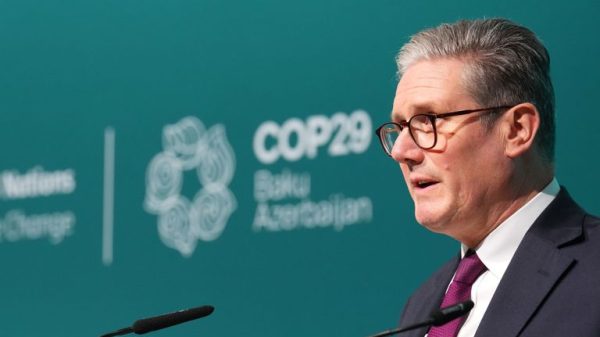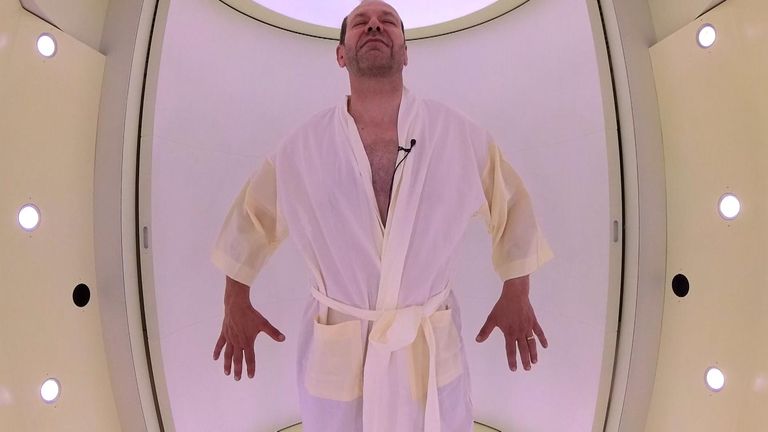A new high-tech screening clinic co-founded by the boss of Spotify hopes to revolutionise healthcare by picking up signs of disease long before there are any symptoms.
Neko Health uses high resolution cameras, lasers and radar to capture millions of data points around the body, checking for problems that could become serious and even life-threatening in future.
It’s the latest in a wave of companies offering controversial high-tech MOTs. Some doctors warn they may increase health inequities and add to NHS workload by referring people with potentially insignificant findings.
Daniel Ek – the chief executive of the music streaming service – and his partner Hjalmar Nilsonne want to engage with the debate.
In one of the clinic’s softly-lit scanning rooms, Hjalmar tells me that healthcare has traditionally been about treating symptoms – “reactive”, as he calls it.
“We have to find a way to become more proactive, more preventative, to help people stay healthy longer,” he says.
“Instead of giving them medicine, give them long-term health.”
Neko Health’s first clinic outside its hometown of Stockholm, Sweden, is a world away from the busy London shopping street that it lies beneath.
It looks like something straight out of sci-fi.
In the centre of the room is a booth not unlike the teleporters in Star Trek.
Step inside and nine cameras – HD, 3D and thermal – take more than 2,000 images to build a high-resolution map of every mole, freckle and blemish on your skin.
If you return for annual checks it allows the clinic to track changes in size, pigmentation and other warning signs of skin cancer.
Next to the booth there’s more tech that could easily have been wielded by Star Trek’s Dr McCoy on his starship crewmates.
To spot early signs of cardiovascular disease lasers analyse the stiffness of arterial walls, shimmering patterns of green light check blood circulation and blood pressure cuffs take simultaneous readings on all four limbs.
There’s a blood sample taken too to measure cholesterol, blood glucose, biomarkers of inflammation and lots more.
In less than an hour millions of data points are collected and analysed, with a doctor explaining the findings.
For the record I, like 79% of those scanned in the Stockholm clinic’s first year, got a clean bill of health.
But 14% of the clients in Sweden needed medical treatment for something picked up in the health check. And 1% had potentially life-saving care for serious problems they were previously unaware of.
More than three-quarters of customers have booked again for a year’s time. Most, it seems, consider the checks worth the £300 cost.
It’s a growing market.
You can pay several thousands to companies offering whole-body MRI scans to see what’s going on below the skin.
Kim Kardashian gave a celebrity buzz to a company called Prenuvo by referring to its scanner as a “life-saving machine” in an Instagram post.
The shift towards disease prevention has big champions.
Professor Sir John Bell, now of the Ellison Institute of Technology in Oxford, was instrumental in creating the UK Biobank, Genomics England, and more recently the Our Future Health study – all initiatives to dive deep into patient data to spot signs of disease.
He says preventative health checks will be the norm in the next 10 years.
Not the rudimentary lifestyle questionnaires the NHS offers to mid-life patients now. There’ll be far more tech – and AI – running the rule over our inner health.
But it’s a mindshift for the NHS.
“People don’t want to talk to you about cardiac problems until you have chest pain, and then they’re quite keen to talk to you,” Professor Bell says.
“But the trouble is, they picked it up too late because for the last 35 or 40 years it’s been accumulating in your cardiac vessels. You’ve been asymptomatic, so nobody’s done anything about it.
“Understanding which diseases you have and capturing them fast at their earliest stage will mean you have a much longer, healthy life expectancy.”
But other doctors are more cautious.
Dr Saira Ghafur, a respiratory physician at Imperial College London, is concerned that the people who are most likely to have underlying health problems are the least likely to be able to afford private check-ups. It could make existing health inequalities even worse, she fears.
There’s also the risk private health checks will add to NHS waiting lists, Dr Ghafur tells me. They’ll pick up lots of issues that need NHS follow-up but ultimately turn out to be nothing to worry about.
And then there’s the lack of evidence that the issues picked up actually matter.
“We have to make sure that we’re doing prevention right,” she says. “For that, we need a very strong evidence base.
“But we are going to have to wait many years to be able to show that doing this screening, collecting these data points, has actually resulted in better (health) outcomes.”
That hasn’t deterred people from signing up to Neko Health. Its Stockholm clinic has a waiting list of 20,000 and it expects strong demand for checks at its London branch.
Hjalmar Nilsonne comes from a family of doctors and says he understands the concerns of an overworked medical profession.
The company does follow-up checks itself to be sure the problems picked up on scan are significant before telling people to seek NHS treatment.
He wants the health service to see preventative health checks as a help, not a hindrance.
“70% of the healthcare costs in society come from chronic disease,” he says. “Most chronic disease can be prevented or greatly delayed if you find it early enough.
“So we’re really focused on finding the early signs that things are going in the wrong direction and helping you find the ways to counteract that and avoid it in the first place.”



























